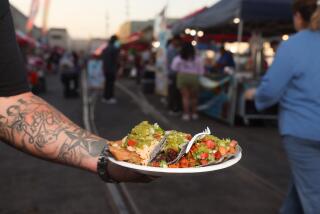Regulating L.A. Street Vendors
- Share via
* I am an owner of a small restaurant on Broadway in downtown Los Angeles. I am experiencing the worst decline in business in my 24 years at this location. Many factors including the state of the overall economy are at fault; but against such a backdrop it is appalling that our city is considering enacting a law for the legalization of street vending without taking into account its impact on businesses such as mine.
Al Martinez, in his column (“Faces in the Street,” Aug. 24) appears to support vending as an answer for one segment of the population, but offers no comparable insight into the effect this could have on owners and employees of businesses which would be left at a competitive disadvantage.
I do not wish to deny anyone the chance to earn their living through a legitimate venture. I came from El Salvador in 1963, became a naturalized U.S. citizen, and have respect for the opportunities this country has provided me. However, supporters of the proposed law must understand that unless vendors are highly regulated and there is enforcement against those who willingly break the law by continuing to sell illegally, the price will be paid by merchants like me.
My monthly obligations (rent, utilities, employee salaries, taxes, and insurance) are in excess of $10,000. This year, more than in previous years, illegal vendors have affected my ability to do business. Dozens of them converge into this vicinity daily, many selling sodas and ice cream at prices below what I am able to charge. My customers are primarily from low-income households and eager to save every penny. They patronize the vendor while I continue to dip into savings to keep my business open. My six employees would be the ones whose faces I would ask the politicians to see if I lose my restaurant.
In fact, I would like to invite our elected officials to come to my restaurant and see for themselves the effect vending is having on this community. Along with the tamales, corn and burritos, many of the vendors I see daily are caught up in sales of forged documents, bus passes and more.
If what we are trying to do is help people to achieve an economic foothold, it deserves consideration. If, however, the intent is to address a complex situation with simplistic solutions, then I believe we will be hurting more people than we will help.
ALICIA SACA
Owner, Licha’s Restaurant
Los Angeles
* Why is it illegal in Los Angeles for poor people to vend flowers, ice cream or tortillas to the community and it is legal for stockbrokers, telemarketers and real estate agents to telephone you in the privacy of your home to sell you their product?
I have a choice of buying or not when I pass a vending cart. However, when someone interrupts my family dinner to sell me something, it has disrupted my meal, made me angry and invaded my privacy.
Why are we keeping the poorest of the poor out of the race for the dollar? Why is it a crime for poor people to sell on the streets and legal for corporations to invade our homes via the telephone to sell their products? Is this economic justice?
TONI REINIS
Marina del Rey
More to Read
Eat your way across L.A.
Get our weekly Tasting Notes newsletter for reviews, news and more.
You may occasionally receive promotional content from the Los Angeles Times.










